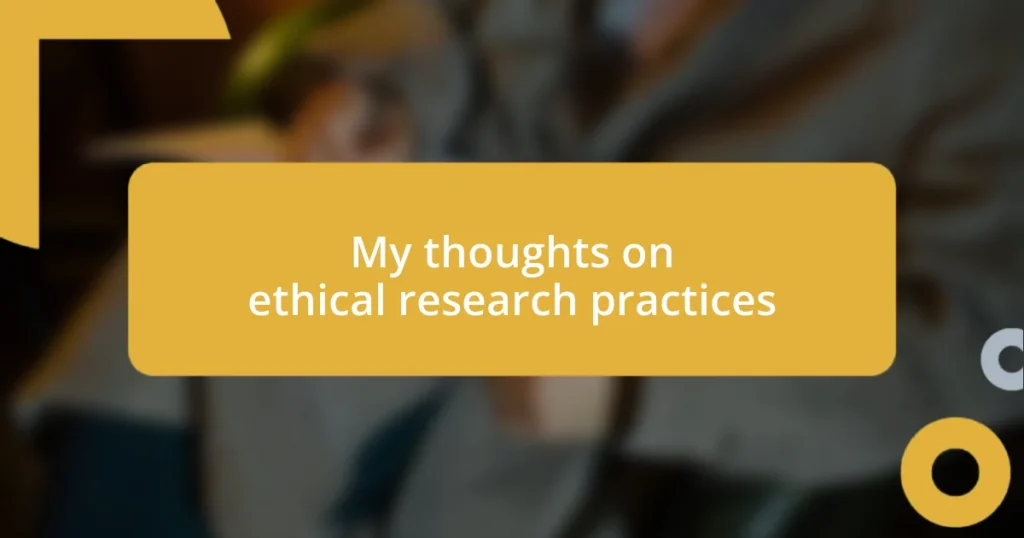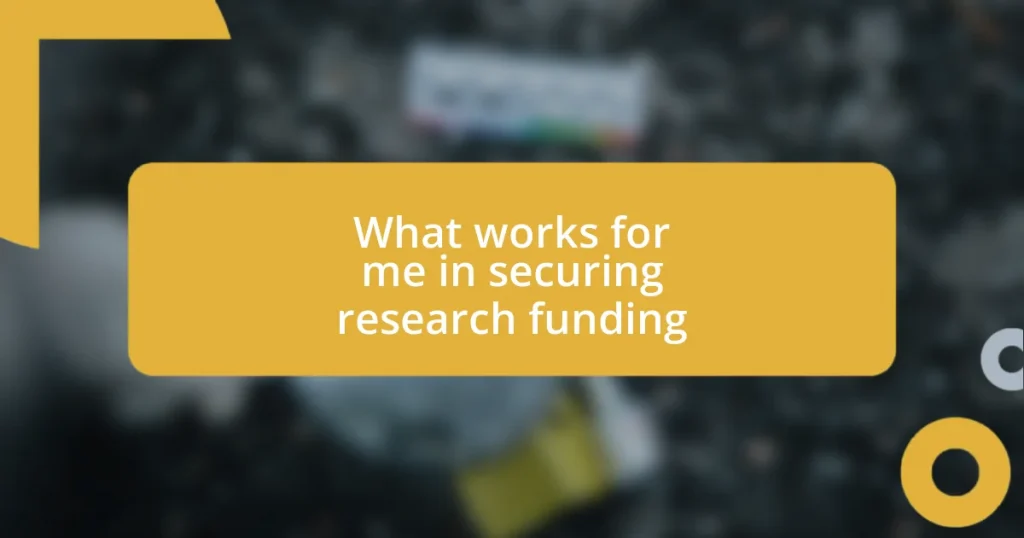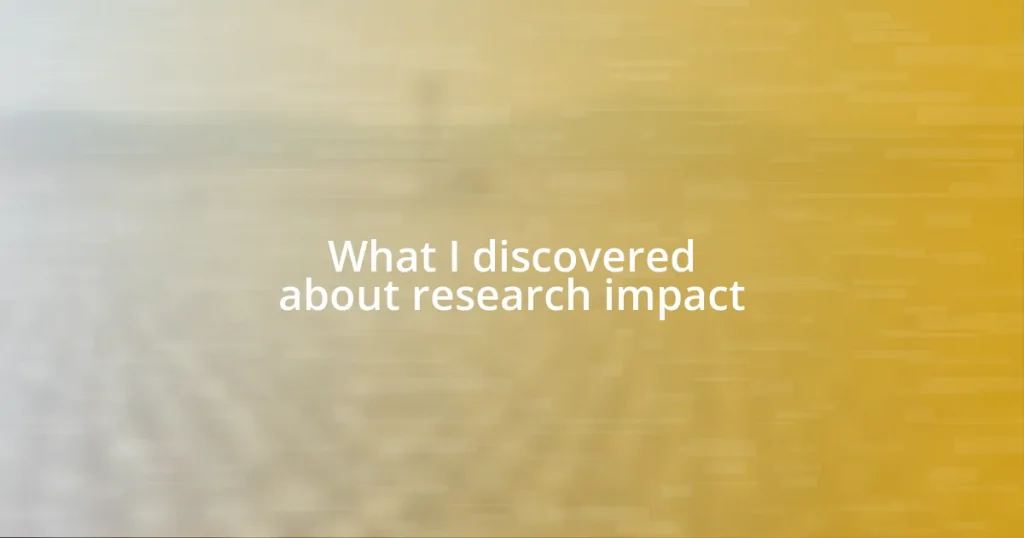Key takeaways:
- Informed consent is essential for respecting participant autonomy and fostering trust, emphasizing the need for clear communication about study risks and benefits.
- Navigating conflicts of interest through transparency and established guidelines is crucial to maintaining research integrity and prioritizing participant welfare.
- Ensuring participant confidentiality and implementing fair recruitment practices are fundamental for ethical research, promoting accountability and inclusivity in diverse participant pools.
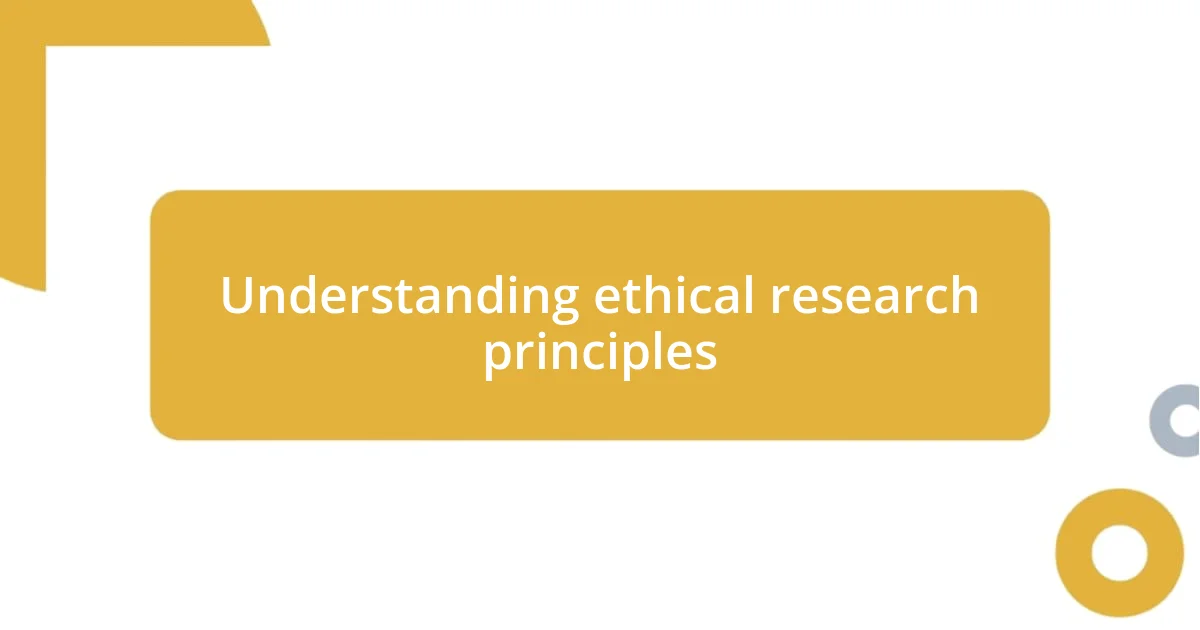
Understanding ethical research principles
Ethical research principles are fundamental guidelines that ensure the integrity and respect for individuals involved in research. I remember my early days as a researcher, navigating the world of ethical considerations made me acutely aware of the responsibility I held. The idea that my study could impact a person’s life—however small—instilled a profound sense of purpose in me.
One of the cornerstones of ethical research is informed consent, which ensures participants are fully aware of the study’s risks and benefits. I often think about a particular project where clear communication about potential outcomes helped participants feel safe and respected. Isn’t it crucial for us as researchers to foster an environment of trust, where participants are empowered to make informed decisions about their involvement?
We also need to consider the principle of beneficence, which emphasizes the well-being of the participant. I’ve encountered situations where researchers may cut corners in pursuit of results, but reflecting on those principles reminds me of my commitment to prioritize the participant’s welfare over mere data collection. How can we truly call our work ethical if we lose sight of those we aim to help?
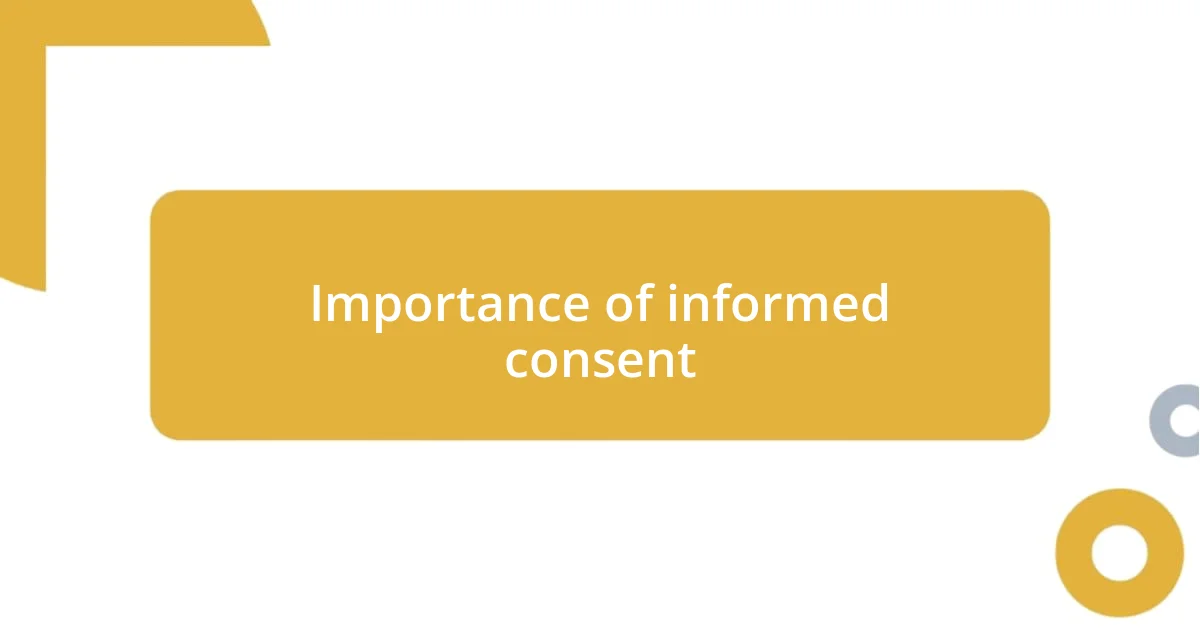
Importance of informed consent
Informed consent is not just a legal formality; it’s an ethical obligation that embodies respect for the participant’s autonomy. I recall a particularly challenging study where I had to explain complex procedures to participants from diverse backgrounds. Taking the time to ensure everyone understood—not just signing a paper—deepened my appreciation for the trust participants place in researchers. This process is crucial, as it builds rapport and encourages transparency, reflecting my commitment to ethical standards.
- Informed consent protects the participant’s autonomy, allowing them to make choices about their involvement.
- It fosters trust between researchers and participants, essential for ethical research.
- A thorough informed consent process conveys respect for the participant’s intelligence and decision-making capabilities.
- It can lead to more meaningful engagement, as participants feel valued and informed throughout the research journey.
- By prioritizing informed consent, researchers uphold their moral responsibility and enhance the overall quality of their studies.
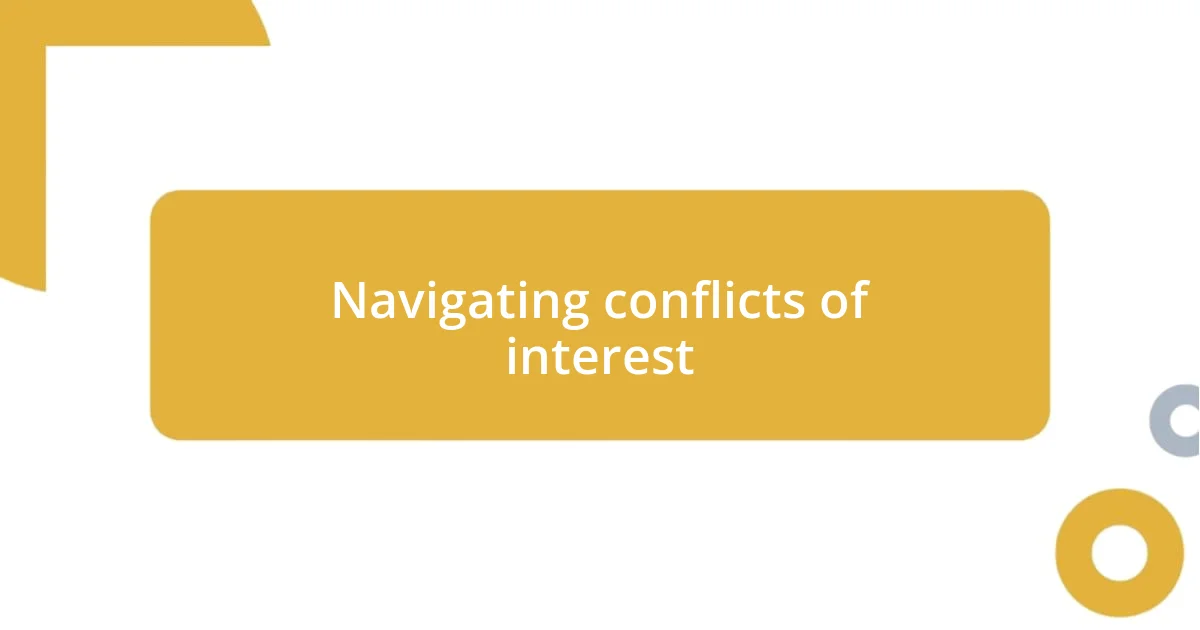
Navigating conflicts of interest
Navigating conflicts of interest in research requires a delicate balance. I’ve found that being transparent about any potential conflicts fosters trust and accountability. There was a time during a study evaluation where I had to disclose my affiliation with a sponsoring organization. That honesty not only maintained the integrity of the research but also reassured participants that their interests were still my top priority.
Conflicts of interest can arise from various sources, such as financial support, personal relationships, or even professional aspirations. I remember grappling with a decision about whether to collaborate with a company that could influence my research outcomes. Ultimately, I chose to step back and prioritize unbiased results, knowing that it was a choice I’d always reflect on with pride. How often do we weigh our professional relationships against our dedication to ethical standards?
An essential strategy for navigating conflicts of interest is establishing clear policies and guidelines. For instance, I once participated in a workshop that emphasized documenting potential conflicts before starting any project. This practice not only clarified responsibilities but also created an environment where ethical concerns could be openly discussed. Such proactive measures can greatly mitigate risks and support the integrity of our work.
| Source of Conflict | Strategies to Address |
|---|---|
| Financial Sponsorship | Full disclosure in publications |
| Professional Relationships | Establishing clear communication |
| Personal Bias | Documenting potential conflicts |
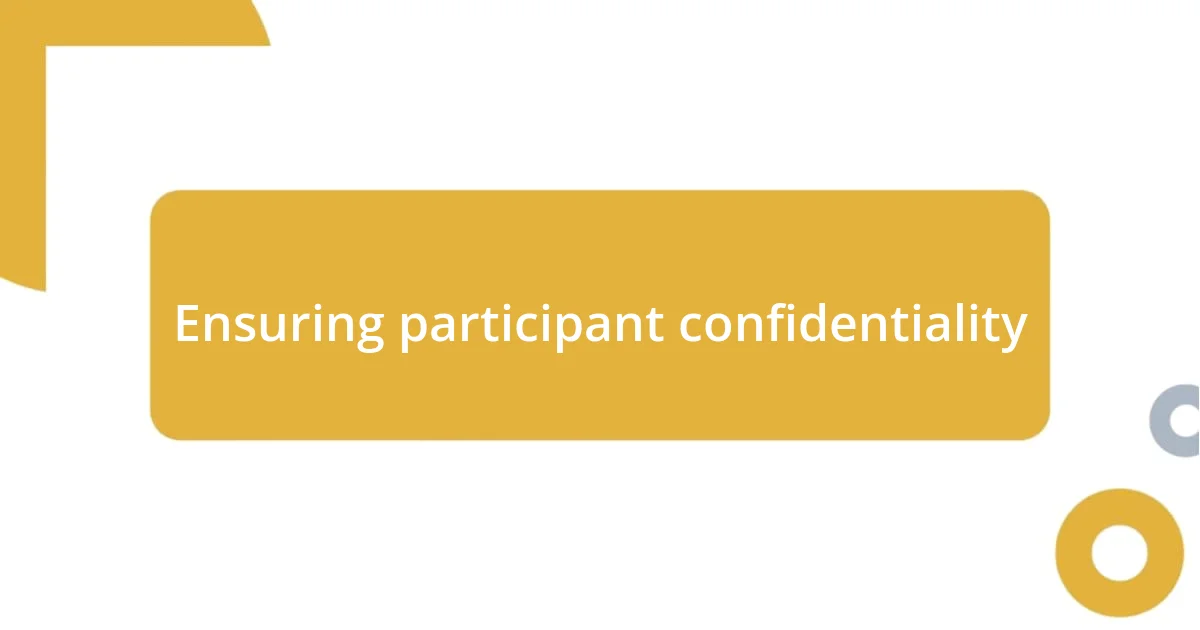
Ensuring participant confidentiality
Ensuring participant confidentiality is paramount in ethical research practices. I remember the first time I conducted interviews for a sensitive project; I felt a weight of responsibility knowing that the personal stories shared could be vulnerable. I made it a point to guarantee that no identifiable information would ever be linked back to the participants. This commitment not only eased their minds but also reinforced the ethical foundation of my study.
During a qualitative study on mental health, confidentiality took on a whole new meaning for me. Many participants shared deeply personal experiences, and I could see the relief on their faces when I assured them that their identities would remain protected. I utilized coded identifiers instead of names to safeguard their privacy—an approach I now consider essential. How can we expect participants to open up if we don’t prioritize their confidentiality the way we should?
Handling data responsibly also extends to data storage practices. I implemented secure, encrypted databases for all participant information, reminding myself that every piece of data represents a trust placed in me as a researcher. It’s crucial to remember that confidentiality doesn’t just stop at participant responses; it involves ongoing vigilance throughout the study’s lifecycle. What steps are you taking to ensure participant confidentiality in your research endeavors? The answers to such questions can help cultivate a culture of respect and integrity in our field.
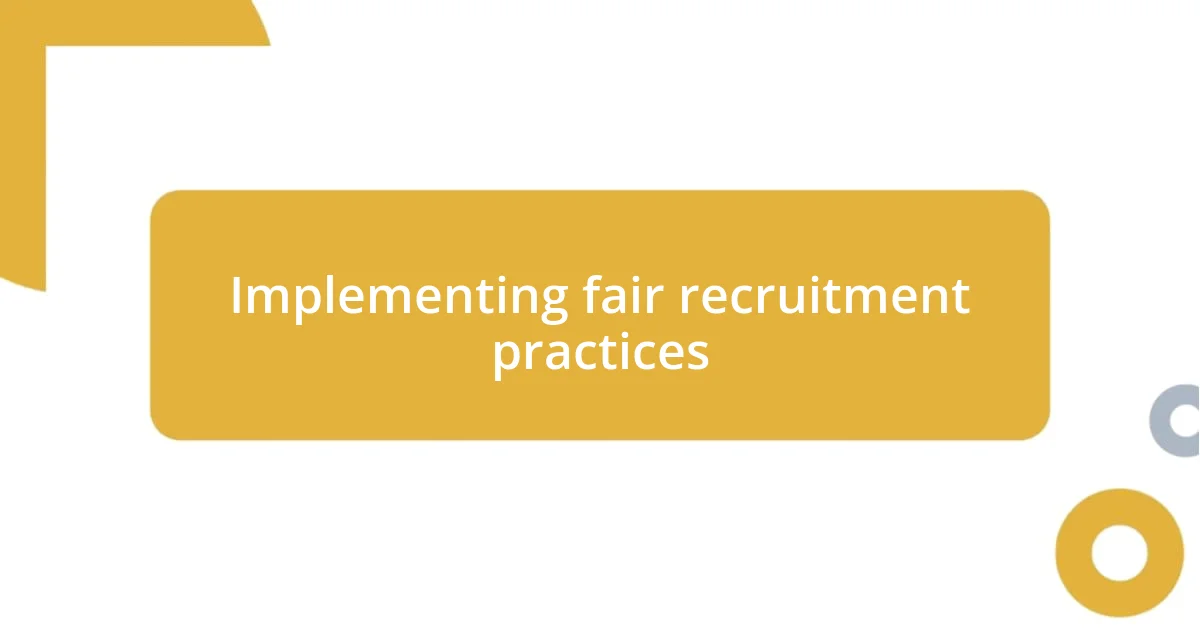
Implementing fair recruitment practices
Recruitment practices in research should always prioritize fairness to ensure a diverse and representative participant pool. I recall a project where we faced challenges in reaching marginalized groups. It sparked a realization that we had been casting too narrow a net, so we adapted our recruitment strategies. By partnering with local organizations and utilizing community outreach, we successfully built trust and increased participation from underrepresented populations. Isn’t it fascinating how a little consideration can lead to much broader perspectives?
To achieve true fairness in recruitment, I believe it’s crucial to eliminate biases at every stage. For instance, I once participated in a study where the recruitment criteria were reassessed. By involving a diverse advisory board to review our inclusion and exclusion criteria, we minimized the risk of biases influencing participant selection. This collaborative approach not only enriched the study but also made me feel more accountable for cultivating an ethical research environment. How often do we stop to question whether our criteria are inadvertently turning away potential voices?
Finally, it’s essential to ensure that participants are fully informed about the recruitment process and any associated expectations. I remember drafting a participant information sheet for a recent study. My goal was to present the information in a way that felt approachable rather than daunting. Including straightforward language and visuals helped demystify the process. Wouldn’t we all appreciate being treated with clarity during such a significant decision? Clear communication fosters trust, and that’s the foundation of ethical research.
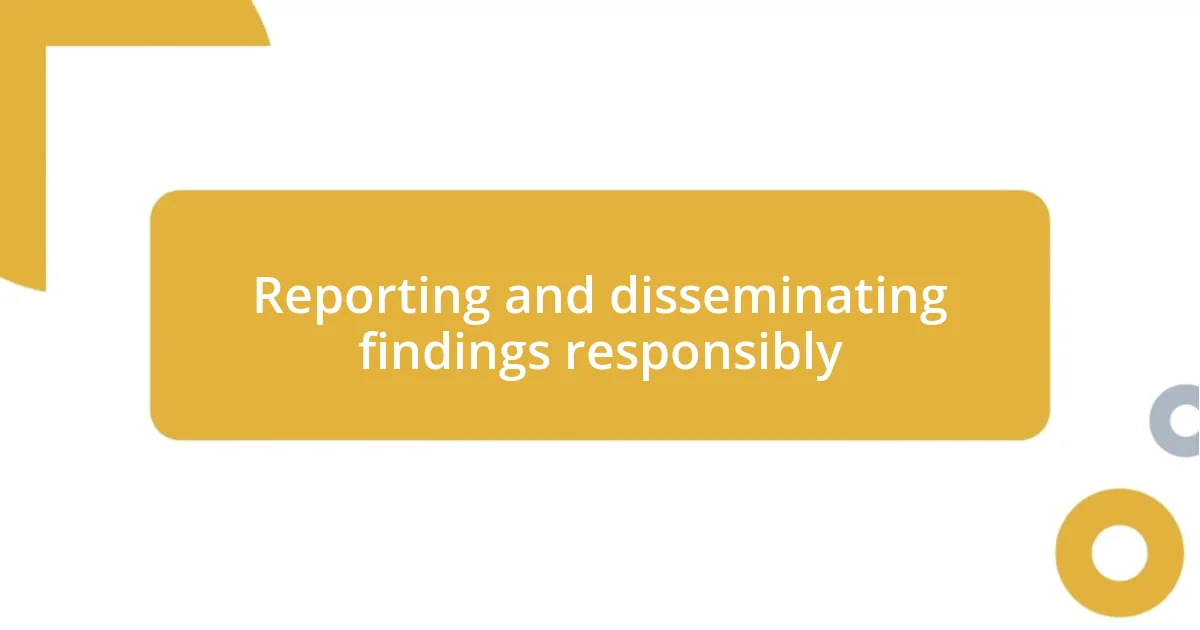
Reporting and disseminating findings responsibly
Reporting and disseminating research findings carries a significant ethical weight. I vividly recall the first time I had to share results from a study on educational interventions. I was excited, but I was also acutely aware of the responsibility stretched before me. Presenting the findings in a way that accurately represented the participants’ experiences, while avoiding misinterpretation, was crucial. After all, how can we remain trustworthy researchers if our reporting isn’t clear and honest?
In my view, the way we frame our findings can greatly influence public perception and understanding. I once witnessed a peer accidentally overstate their results, leading to confusion among stakeholders. This reinforced my belief that responsible dissemination requires careful attention to language and context. I honestly think that failing to communicate findings thoughtfully can misrepresent the research’s impact—and isn’t that a disservice to everyone involved?
Another vital aspect is audience consideration: who are we sharing our findings with, and how might they interpret them? During a community presentation, I adapted my language and visuals to resonate with a lay audience. As I saw their engaged reactions, I realized the importance of making research accessible. It’s fascinating how even small adjustments can lead to greater understanding. What strategies do you employ to ensure your findings reach the intended audience in a responsible manner? Engaging with these thoughts can shape the integrity of our research practices.










